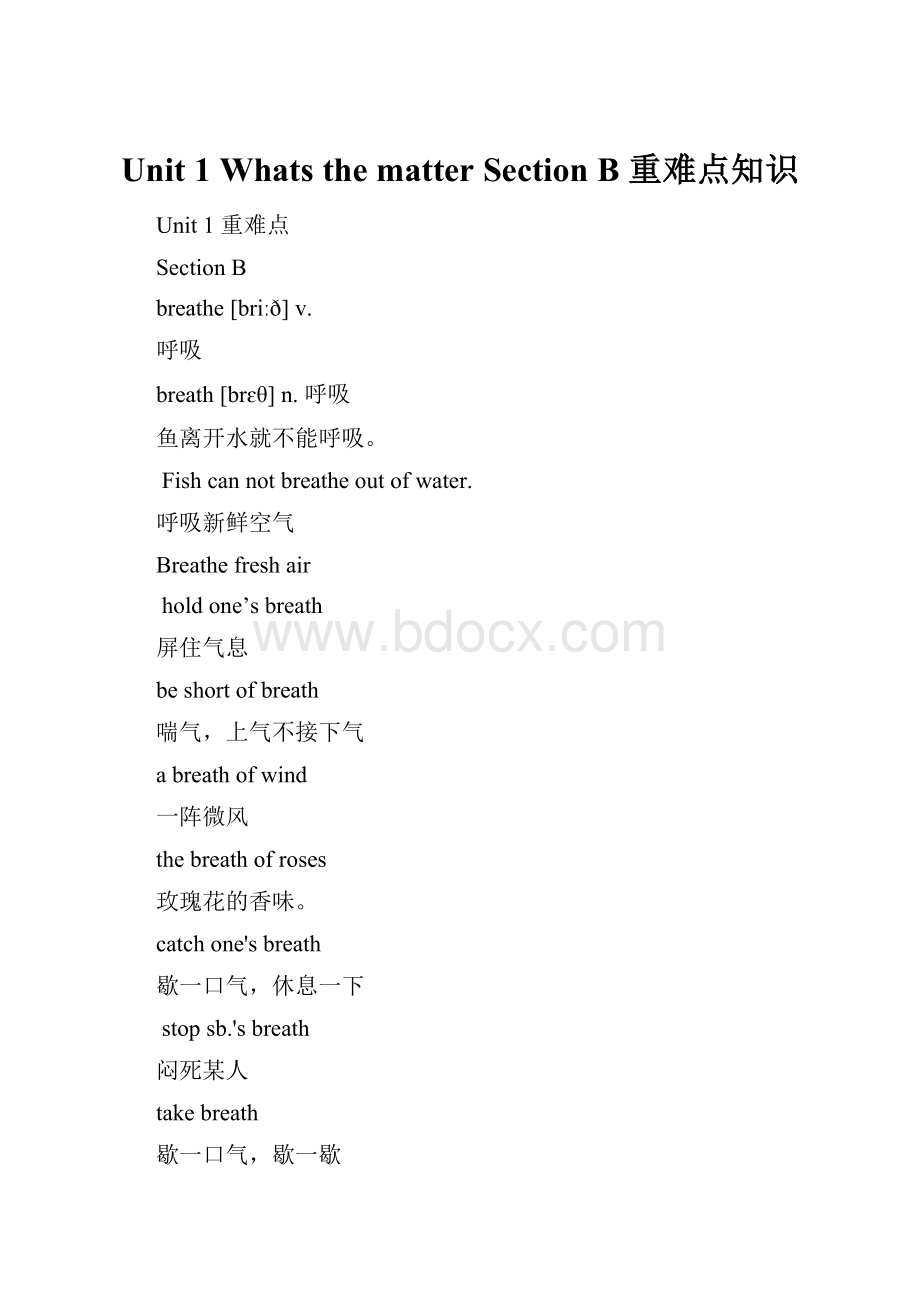Unit 1 Whats the matter Section B 重难点知识.docx
《Unit 1 Whats the matter Section B 重难点知识.docx》由会员分享,可在线阅读,更多相关《Unit 1 Whats the matter Section B 重难点知识.docx(20页珍藏版)》请在冰豆网上搜索。

Unit1WhatsthematterSectionB重难点知识
Unit1重难点
SectionB
breathe[briːð]v.
呼吸
breath[brɛθ]n.呼吸
鱼离开水就不能呼吸。
Fishcannotbreatheoutofwater.
呼吸新鲜空气
Breathefreshair
holdone’sbreath
屏住气息
beshortofbreath
喘气,上气不接下气
abreathofwind
一阵微风
thebreathofroses
玫瑰花的香味。
catchone'sbreath
歇一口气,休息一下
stopsb.'sbreath
闷死某人
takebreath
歇一口气,歇一歇
withouttakingbreath
不歇地,一口气地
takeadeepbreath
长长地吸一口气,
takesb.'sbreath(away)使大吃一惊〔美语常省去away〕
fighttothelastbreath
战斗到最后
sickadj.生病的,有病的
sicknessn.疾病,呕吐
短语
感觉不舒服
feelsick
生病,患病
getsick
knee膝盖knees
恳求哀求
onone’sknee
让/告诉某人不要做某事
tellsb.nottodosth.
Someonegothitonthehead.
hit+sb.+介词+the+身体部位
打某人的某个部位
in用于涉及身体表面较软或较空的部位
on用于身体较硬的部位
hitsb.intheface(eyemouthstomachetc.)
hitsb.onthehead(nosebackchestetc.
hit一、作动词时可以是及物动词或不及物动词
1.表示“打击;击中”,如果强调“击中某人某个部位”以用“hitsb.inthe+部位”。
子弹bullet射中了警官的肩膀。
Thehitthepoliceofficerintheshoulder.
2.表示“使碰到;撞击”,主要作及物动词,间或作不及物动词。
电视的出现沉重地打击了电影业industry。
Televisionhashitthecinemaindustryveryhard.
3.表示“(主意、念头等)突然被想到”。
我今天早晨醒来时突然想到了这个主意。
TheideahitmewhenIwokeupthismorning.
4.表示“袭击;使受害”,通常作及物动词。
物价上涨increase冲击了每个人的钱袋。
Priceincreaseshiteveryone‘spocket.
罢工的浪潮Strikewaves袭击了好几个西欧国家。
StrikewaveshitseveralWesternEuropeancountries.
二、作名词
1.表示“打;击;命中”,是可数名词。
直升飞机虽然被击中了8次,但还是安然着陆了。
Thehelicopterhadtakeneighthitsbutsomehowmanagedtoland.
2.表示“轰动一时的成功的人或事;风靡一时的作品”。
这首歌曲立刻风靡一时。
Thesongwasahitatonce.
3.相关短语
makeahit(withsb.)大获成功;很受(某人)欢迎。
这部新影片大受公众欢迎。
Thenewfilmismakingagreathitwiththepublic.
4.点击,访问
这个网址在第一周有2000次的访问量。
Thewebsitehad2000hitsinthefirstweek.
hurt的用法
1.用于本义,表示身体上的“受伤”“疼痛”,此时通常通常连用的副词修饰语有badlyseriouslyslightly等。
看上去吉姆伤得并不严重。
Jimdidn’tlookseriouslyhurt.
他们在事故中受了重伤
Theywerebadlyhurtintheaccident.
我的背疼。
Mybackhurts.
2.用于引申义,表示感情上的“伤害”,此时通常连用的副词修饰语有deeplyextremelyreallyterriblyvery(much)greatly等。
如:
她的话深深地伤害了他。
Herremarkhurthimdeeply.
听了他的话我很痛心。
Iwasverymuchhurtatwhathesaid.
英语伤我千百遍,我待英语如初恋。
EnglishhashurtmeathousandtimesbutIstillregarditasmyfirstlove.
3.behurt后可接动词不定式或that从句。
想到他一个人留在那儿她就难受。
Shewashurttothinkofhisbeingleftalone.
我没去参加她的晚会,她感到不快。
ShewashurtthatIhadnotgonetoherparty.
摔倒falldown
对感兴趣beinterestedin
习惯于beusedto…
因为becauseof
用完runoutof
准备做bereadytodosth.
切除cutoff
离开getoutof…
掌管,管理incontrolof…
继续或坚持(做某事)keepondoingsth.
sothat既可引导目的状语从句又可引导结果状语从句。
引导目的状语从句时可译为“为了”
引导结果状语从句时可译为“以便”。
e.g.Ispeakloudlysothatallthestudents
canhearmeclearly.(目的状语从句)
Marialikesthewoolendresssothat
shedecidestobuyitimmediately.
(结果状语从句)
so...that...中的so是副词,常用来修饰形容词或副词,“如此……以致于……”。
主语+谓语+so+adj./adv.+that从句。
e.g.那个男生跑得如此之快以至于我赶不上他。
TheboyransofastthatIcouldn'tcatchhim.
so+adj.+a(n)+单数名词+that从句。
e.g.昨天天气很好,我们都出去野餐了。
Itwassofineadayyesterdaythatweallwentoutforapicnic.
1)sothat引导目的状语从句时,表示“以便;为了”,从句中常使用can/could/may/might/will/would/should等情态动词或助动词;引导结果状语从句时,从句中一般不用can和may等词。
2)sothat引导目的状语从句前不用逗号,sothat引导的结果状语从句与主句之间常有逗号相隔开,“因此;所以”。
e.g.
他努力学习,争取考试能获得好成绩。
Heworkedhardathislessonssothathecouldgethighgradesintheexams.
他努力学习,结果考试获得了好成绩。
Heworkedhardathislessonssothathegothighgradesintheexams.
3.ThereweremanytimeswhenAron
almostlosthislifebecauseofaccidents.
这是由when引导的定语从句。
修饰前面的名词times。
e.g.我想起了呆在伦敦的幸福时光。
IthoughtofthehappydayswhenIstayedinLondon.
他仍旧记得你把书作为礼物送给他的时候。
Hestillremembersthetimewhenyou
gavehimthebookasagift.
4.…hewroteabookcalledBetweena
RockandaHardPlace.
BetweenaRockandaHardPlace.此句为习语。
表在艰难或危险的处境下“从两难中进行选择”。
e.g.
当你母亲和妻子在水中时你会救谁?
Whowillyousavewhenyourmotherandwifearebothinwater?
这是(一个)两难的选择。
It’sbetweenarockandahardplace.
becausebecauseof
Betty迟到是因为大雨。
(becauseof)
Bettywaslatebecauseoftheheavyrain.
Betty迟到是因为大雨。
(because)
Bettywaslatebecauseitrainedheavily.
Thismeansbeinginadifficultsituationthatyoucannotseemtogetoutof.
meanv.“……意思是”或“意味着”。
e.g.你的意思是什么?
Whatdoyoumean?
What’syourmeaning?
HefoundhimselfinaverydangeroussituationwhenclimbinginUtah.
在时间、条件、让步状语从句中,如果从句的谓语含有be,主从句的主语一致,或者主语是it时,从句的主语和谓语的一部分可以省略,用“连词+分词”表示。
过马路时要当心.
Becarefulwhen(youare)crossingtheroad.
他走过公园时在欣赏那些美丽的鲜花。
Hewalkedpasttheparkwhenenjoyingthebeautifulflowers.
free的用法1.表示“自由的”、“自发的”、“独立自主的”等义,有比较等级的变化(freerfreest);表示“空闲的”、“空着的”、“免费的”等义,没有比较等级变化。
如:
她相信妇女应该更自由些。
Shebelievesthatwomenshouldbefreer.
他每周有一个下午空闲。
Hegetsafreeafternoononceaweek.
这饮料是免费的吗?
Arethedrinksfree?
befreetodosth可以自由地做某事。
如:
要走要留悉听尊便。
Youarefreetogoortostay.
有问题请随便问。
Pleasefeelfreetoaskquestions.
befreewith对…随便。
如:
他花钱随便。
Heisfreewithmoney.
对你父母的态度。
Don’tbetoofreewithyourparents.
除用作形容词外,还可以用作动词(意为:
放走,解除)或(意为:
免费地)。
如:
我把放了出去。
Ifreedthebirdfromthecage.
儿童免费入场(beadmitted)。
Children(are)admittedfree.
注意用作副词的free与freely不同。
如:
前者指“免费”,后者指“无限制地”、“自由地”。
如:
你用这张特别的票可以。
Youcantravelfreewiththisspecialticket.
你可以自由地到这个国家的各个地旅行。
Youcantravelfreelytoallpartsofthecountry.
runout与runoutof
runout是动副型,作,表示“被用完了(=beusedup)”的被动含义,其通常是时间、金钱、食物等无生命名词。
例如:
他的钱很快就花完了。
Hismoneysoonranout.=
Hismoneywasusedupsoon.
runoutof短语动词,作用,后接,表示“用完(useup)”的主动含义,主语只能是人。
他把汽油用完了。
Heranoutofgas.
runoutof还有“从(某处)流出(跑出)”的意思;runout也有“流出,跑出”的意义,但其后不能接宾语。
例如:
他跑出了房间。
Heranoutoftheroom.
水从有裂缝的罐crackedjug中流出。
Thewaterranoutofthecrackedjug.
Aronisusedtotakingrisks.
risk用作动词时,为及物动词,表示“冒……的危险”“使遭受危险”。
如:
他们冒了生死危险使我们生活得更安全。
Theyrisktheirlivesinorderthatwemaylivemoresafely.
riskdoingsth.后接动词作宾语时,要用动名词,不能用不定式。
如:
他们冒失去一切的危险。
Theyriskedlosingeverything.
2.用作名词时,注意以下用法:
(1)要表示冒危险,通常与动词runtake等搭配。
(1)要表示冒危险,通常与动词runtake等搭配。
如:
为什么要冒这种危险?
Whyruntherisk?
我们不能冒任何风险。
Wecouldn’ttakeanyrisks.
(2)表示“……的危险”,其后通常接ofdoingsth。
如:
他不敢冒被警察抓住的危险。
Hedarenotrun/taketheriskofbeingcaughtbythepolice.
bereadytodo乐于/已经准备好了做某事bereadyfor已经做好```的准备
getreadytodo/getreadyfor为……做准备(一般用于进行时态)
我都已经准备好了去做你想做的任何事情。
I‘mreadytodoanythingyouwanttodo
学生们正在为考试做准备。
Thestudentsaregettingreadyfortheexam.
学生们为考试做好了准备。
Thestudentsarereadyfortheexam.
climbdown爬下
那个男生爬下了那棵树。
Theboyclimbeddownthetree.
keepondoingsth.继续做某事
他继续在那里站了半个小时。
Hekeptonstandingthereforhalfanhour.
usedtodo过去常常做某事(现在不再做了)
beusedtodoing习惯于做某事
beusedtodosth被用来做某事
usesth.todosth.用。
。
。
做某事
beusedfor(doing)sth.被用于做某事
他过去是一个语文老师。
HeusedtobeaChineseteacher.
他过去喜欢旅行。
Heusedtoliketravelling.
他过去喜欢旅行。
Heusedtoliketravelling.
我父亲习惯于晚饭后去散步。
Myfatherisusedtowalkingaftersupper.
我们用笔写字。
Weusepenstowrite.
那个小刀被用来切纸。
Theknifeisusedtocutpaper.=
Theknifeisusedforcuttingpaper.
cutoff切除接代词,放中间
他砍下了一根树枝。
Branch
Hecutoffabranchfromthetree.=
Hecutitofffromthetree.
常见词组
切掉减掉
cutaway
砍倒削减
cutdown
切为两半
cutintohalves
切碎
cutup
切成碎片
cutintopieces
插嘴
cutin
mean-meant-meant意欲,打算,意思是,意指意味着
meantodosth.打算做某事
meandoingsth.意味着做某事
mean+从句打算/意思是
我打算明天去北京,但我父亲不让我去。
ImeantogotoBeijingtomorrowbutmyfatherwillnotallowmeto.
做那个意味着浪费时间。
Doingthatmeanswastingtime.
Whatdoyoumeanby…?
Whatdoes…mean?
What’sthemeaningof…?
…是什么意思?
你的话是什么意思?
Whatdoyoumeanbyourwords?
Dictionary是什么意思?
Whatdoes“dictionary”mean?
=
What’sthemeaningof“dictionary”?
important重要的
unimportant不重要的
importance重要性,重要
theimportanceof(doing)sth.做某事的重要性
很多同学不理解学习英语的重要性。
Manystudentsdon’tunderstandtheimportanceoflearningEnglish.
makeadecisiontodosth.
=dicidetodosth.决定做某事
他长大后决心当一名医生。
Hemadeadecisiontobeadoctorwhenhegrewup.=
Hedecidedtobeadoctorwhenhegrewup.
controln.v.掌管,控制
beincontrolof掌管,控制
控制大城市的交通很重要。
It’simportanttocontrolthetrafficinlargecities.
失去控制
outofcontrol
在控制之中
undercontrol
控制住某事
keepsth.undercontrol
交通管制
trafficcontrol
giveup(doing)sth.放弃(做)某事
giveup放弃接代词,放中间
他最终戒烟了。
Hegiveupsmokingatlast.
尽管数学很难,但是你还是不能放弃它。
Althoughmathisdifficultyoushouldn’tgiveitup.
拓展
屈服投降
givein
归还
giveback
帮某人的忙
givesb.ahand
赠送泄露
giveaway
发出(光、气味等)
giveoff
一、mind用作名词时意为“思想”、“想法”、“头脑”、“智力”。
changeone’smind(改变主意)
makeupone’smind(下定决心)
keep...inmind(牢记……)
comeintoone’smind(浮现在脑海)
二、mind用作动词时意为“介意”、“反对”。常见的含动词mind的句式有:
“Would/Doyouminddoingsth?
”意为“劳驾……好吗?
”或“请问(你)可否……”常用来表示委婉、客气的请求。
劳驾把门关上好吗?
Wouldyoumindclosingthedoor?
2.“Would/Doyoumind+人称代词宾格或形容词性物主代词+doingsth?
”意为“某人做某事你介意吗?
”。would的语气显得更客气、更委婉一些。
我把窗户关上你介意吗?
Doyoumindmyclosingthewindow?
注意:
“Wouldyoumind...?
”和“Doyoumind...?
”对上述问句需要使用一些客气、委婉的方式作反意回答。
如果表示不反对或不介意常用“Nonotatall./Ofcoursenot./Certainlynot./Nodoitplease./Nopleasedo./Nogoahead.”等作答。
例如:
劳驾把那本词典递给我好吗?
—Doyoumindpassingmethedictionary?
没问题。
—Nonotatall.
我在这里抽烟你不见怪吧?
—Wouldyoumindmesmokinghere
没关系请便。
—Nopleasedo.
2)如果表示介意、不同意或不赞成某人做某事回答时通常用“SorrybutIdo.”或“Sorry./I’msorry./Iwishyouwouldn’t.”然后最好再陈述某种表示拒绝或反对的理由。
例如:
我在这里吸烟可以吗?
—DoyoumindifIsmokehere?
对不起你不能。
SorrybutIdo.
我把灯关掉行吗?
—Wouldyoumindmyturningoffthelight?
对不起我还没有完成工作。
—Iwishyouwouldn’t.Ihaven’tfinishedmywork.
3.“Idon’tmind.”意为“我不介意”、“随便”。例如:
你要茶还是咖啡?
—Teaorcoffee?
随便。
—Idon’tmind.
Nevermind”意为“没关系”、“不要紧”常应用于下列场合:
1)回答对方的致歉。
例如:
对不起我来得匆忙